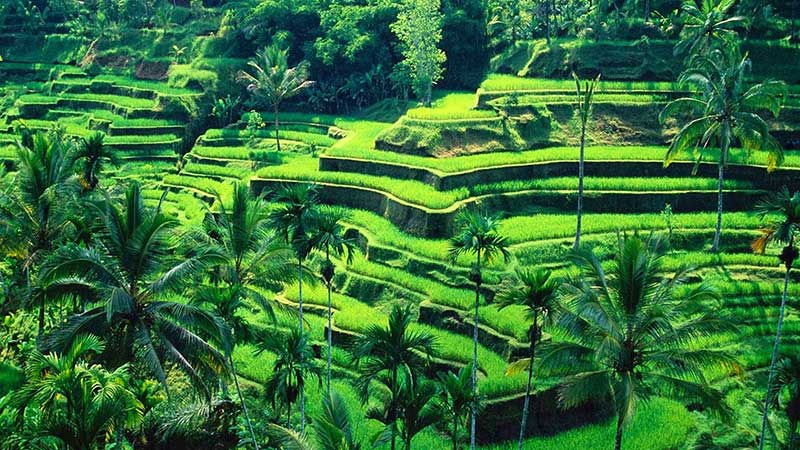|
Is it possible to create paradise on Earth? It depends on what you mean by "paradise," of course. If defined as a place or state of harmonious connection with Nature and with one another, there is no doubt that paradise is possible. We see people living in this manner in small pockets throughout the world. And each of us has experienced periods in our lives when we have found ourselves in paradise. The concept of paradise has ancient origins. The Greeks used the term paradeisos to refer to a playground fit for kings and gods. In the West, we have come to associate paradise with Eden, the biblical garden of delight where Adam and Eve lived in blissful integration with the natural world. Re-creating paradise seems like a Herculean task, especially at a time when humanity seems so divided and has wrought such devastation on the planet. Can we even stop, let alone reverse, the environmental damage that billions of us are causing on a daily basis? That is truly one of the greatest challenges that our species has ever faced. It is compounded by the fact that our creative power as individuals feels so limited in a world dominated by giant corporations and the ultra-wealthy. But I believe in our power to create lasting positive change. In three decades of studying human creativity, I have seen the profound impact a single individual can have on the world (e.g. Gandhi, Mother Teresa, Einstein, or MLK). In a recent blog post on VictorShamas.com, I reiterated one of the 10 Tenets of Deep Creativity, which is that ALL CREATING IS BECOMING. We can create paradise on Earth by embodying it ourselves individually and then making it a reality collectively. Where do we start? The answer is simple: VISION. This is one of the six qualities that my research has shown to be linked to inspired creativity. You cannot create something that you have not yet envisioned. So, what does paradise look like? How does it work? What are the day-to-day practicalities of implementing and sustaining such a way of life? What follows is my personal vision of paradise on Earth. This is just a first take, an attempt to open up a dialogue with visionaries like you who are ready to bring about a new era of peace, sustainability, and balance on this planet. I welcome an open and lively discussion with all individuals and groups committed to making this crucial leap in human evolution. Please contact me if you want to be included in what I believe to be one of the most important ventures of our times. A Vision and Aspiration
Victor Shamas, Ph.D. The wisdom that brings us together today is the understanding that there is only one pure essence of being in the universe. That essence abides in everything and everyone on this great Earth. It connects us all. Today, we join in a shared aspiration for ourselves and for humanity: From this day forward, we shall live in alignment with this essential wisdom. As human beings, we recognize our connection to one another, regardless of our differences, and choose to treat all people with respect, kindness, honesty, and compassion. We may despise someone’s words and actions but not the person. We pledge never to harm anyone intentionally and to do everything in our power to eliminate from the world all weapons that function only to harm or kill—especially weapons of mass destruction. We may form groups, communities, and societies based on our common interests and concerns but never with the intention to dominate, harm, exploit or exclude anyone. Because we recognize the one pure essence that binds us, we make the commitment to build communities that are cooperative, peaceful, and just. We protect the right of all human beings to breathe fresh air, drink pure water, eat nourishing food, and live in safe homes free from poisons or dangers of our making. And we extend these same rights to all life, including plants, animals, and microbes. We offer every human being equal access to quality education and health care. In terms of material wealth, we guarantee that anything we accrue during the course of our lives be distributed fairly in the world by the time of our death. And we no longer allow such wealth to include the finite treasures of this planet, including land, water, air, minerals, fossil fuels, or forms of life. The economies we seek to establish operate locally, promote a commitment to service over profit, and offer the greatest rewards to those who give the most of themselves. Most importantly, these economies empower us to produce what our communities need in order to thrive in alignment with the natural world and never in opposition to it. Each of us gains self-reliance by developing the practical skills needed to live happily and harmoniously on this great Earth. As an integral part of a global ecosystem, we commit to the preservation and expansion of wilderness so that life in all its diverse forms can continue to flourish and co-exist. We eliminate waste from our lives, making sure that everything we release into the environment, including any product of our industry or of our metabolism, serves as nourishment for the Earth and the life forms that derive from it, or at the very least is inert and free of toxicity. We act to sustain and nurture the places, species and individuals that sustain and nurture us. Rather than treating anyone or anything as unwanted pests, we recognize imbalances in the ecosystem and respond only in ways that restore that balance. We learn to dismantle and deconstruct cities, re-configuring them on a more human scale to reduce the energy demands of our communities and to facilitate human-powered forms of transportation. In our personal choices, we prioritize quality-of-life over standard-of-living, finding ways to simplify our needs so that we can maximize well-being while minimizing consumption. We strive to eliminate our carbon footprint entirely through a combination of reduced energy demand, the development of new technologies that use renewable energy effectively with no negative environmental or social impact, and the implementation of regenerative farming and gardening practices. We do not permit or condone the exploitation of human beings or other forms of life. Those who contribute to our ability to thrive are deserving of our deepest gratitude and honor, including the plants and animals that provide food and other needs, as well as the humans that labor and sacrifice for our benefit. We aspire to know the history and destination of every gift bestowed upon us so that we recognize their true cost and can make mindful decisions to support only those forms of production that are humane and sustainable. We adopt a judicial system that emphasizes reward over punishment, that balances a commitment to the common welfare with the protection of individual rights, and that is proactive in terms of preventing mental health issues and remedying other causes of antisocial behavior, including poverty, inequality and misinformation. Our highest priority is the welfare of future generations, including those younger than ourselves as well as the unborn. This does mean sacrificing the sovereignty of any living person to make decisions about their own body, but it does mean making certain that we leave the world at least as peaceful, sustainable and balanced as we found it, and preferably more so. We strive to set the highest example for future leaders, showing them how the primary role of leadership is to serve the needs of this great Earth and all its constituents. We establish a global council that provides guidance to leaders at all levels on how to proceed in accordance with the wisdom we embrace, which recognizes the one pure essence that abides in each of us and that connects us all. And so it is.
0 Comments
Leave a Reply. |
AuthorAll blog posts are written by either Dr. Victor Shamas or guest bloggers. To write a guest blog, please CONTACT US. Archives
January 2021
Categories |


 RSS Feed
RSS Feed
